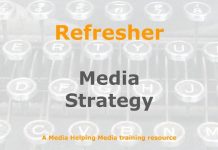 This intensive one-day course offers senior journalists and media professionals a rigorous refresher on the core skills necessary to become effective Trainers of Trainers (ToT).
This intensive one-day course offers senior journalists and media professionals a rigorous refresher on the core skills necessary to become effective Trainers of Trainers (ToT).
We will cover the complete training cycle, from conducting needs assessments and designing measurable objectives to mastering delivery techniques and evaluating long-term impact.
This refresher is based on the six-week module on Training of Trainers which you are free to download, adapt, and use.
We recommend that trainers circulate the recommended reading resources listed below and encourage participants to read them before attending this refresher.
Learning objectives
Upon completion of this course, participants will be able to:
- Understand and apply the core principles of adult learning and essential trainer qualities.
- Execute a needs assessment and develop a successful, focused training plan.
- Create specific, measurable, achievable, relevant, and time-bound (SMART) training objectives.
- Master professional delivery and facilitation techniques to maximise learning retention.
- Design and implement effective evaluation and impact assessment tools for training programmes.
Programme schedule
This schedule condenses the six-week module into four focused 90-minute core sessions, integrating all key concepts and resources.
Session 1: Foundations and the trainer mindset (9:00 – 10:30)
- Topics covered: Introduction to the Training of Trainers (ToT) model; exploring the core principles of adult learning; identifying the essential qualities of an effective media trainer; and adopting the right supportive and professional attitude for training delivery.
- Activity: Group discussion and self-assessment: analysing personal training strengths and identifying areas for development based on the core qualities of a trainer.
- Recommended reading:
(10:30 – 10:45) Break
Session 2: Needs assessment and programme design (10:45 – 12:15)
- Topics covered: Conducting a structured gap analysis to identify discrepancies between current and desired skills; setting SMART objectives to ensure training is measurable and relevant; and the step-by-step process of designing a comprehensive media training plan.
- Activity: Practical exercise: transforming vague training goals into a minimum of three specific SMART objectives and drafting the initial framework for a training plan.
- Recommended reading:
(12:15 – 13:15) – Lunch
Session 3: Content delivery and impact maximisation (1:15 – 2:45)
- Topics covered: Mastering the basic rules for delivery, including establishing ground rules and managing the training environment; the five essential steps for media training success (e.g., getting management buy-in); and exploring techniques for maximising the impact of training and long-term retention.
- Activity: Role-playing and peer feedback: participants practise delivering a short section of content using the learned rules, focusing on clarity, engagement, and managing audience dynamics.
- Recommended reading:
(2:45 – 3:00) – Break
Session 4: Evaluation, feedback, and peer review (3:00 – 4:30)
- Topics covered: Distinguishing between evaluation, impact, and assessment; developing effective tools for measuring training effectiveness and long-term behavioural change; and analysing how media assistance could improve by better understanding recipient perspectives.
- Activity: Practical task: designing a post-training evaluation form focused on measuring long-term impact rather than just satisfaction; concluding with final reflections and action planning.
- Recommended reading:
Concluding summary and discussion (4:30 – 5:00)
By reviewing these critical components, participants gain a holistic understanding of the training lifecycle. This course equips senior journalists not only with the ability to design and deliver high-quality, impactful training but also to continuously evaluate and improve their programmes, ensuring they remain relevant and contribute measurably to the professional development of the media industry.
End the day with an open discussion with participants.








